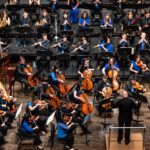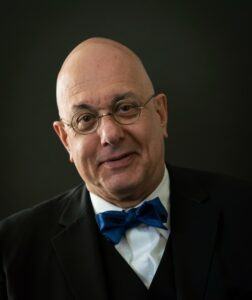The Orchestra Now
Exodus: Jewish Composers in Exile
November 4, 2023
The Orchestra Now
November 4, 2023


Leon Botstein conductor
Noam Heinz baritone
Alexandre Tansman
Polish Rhapsody
Josef Tal
Exodus (U.S. premiere)
Walter Kaufmann
An Indian Symphony (U.S. premiere)
Marcel Rubin
Symphony No. 4, Dies irae
Leon Botstein and The Orchestra Now perform rarely heard works by Jewish composers written while they were in exile from their homelands during World War II.
Renowned Polish composer Alexandre Tansman fled Europe for the United States in 1941, and his rhythmic Polish Rhapsody—inspired by the invasion of Poland and dedicated “to the defenders of Warsaw”—was premiered in St. Louis that same year. Prolific composer Josef Tal emigrated to Jerusalem in 1934, and his dramatic Exodus, based on the Passover Haggadah, was debuted by the Israel Philharmonic Orchestra during the first days of that country’s War of Independence. Walter Kaufmann was one of many Jewish refugees who found a haven in India, where he lived for 14 years and wrote his Indian Symphony. Viennese composer Marcel Rubin fled first to France and then to Mexico, which is where he wrote his melancholy Symphony No. 4, Dies irae, reflecting his experiences during the Second World War.
Hear this program at the Fisher Center just days before TŌN performs it at Carnegie Hall.

Leon Botstein is founder and music director of The Orchestra Now (TŌN), music director and principal conductor of the American Symphony Orchestra (ASO), artistic codirector of Bard SummerScape and the Bard Music Festival, and conductor laureate and principal guest conductor of the Jerusalem Symphony Orchestra (JSO), where he served as music director from 2003 to 2011. He has been guest conductor with the Los Angeles Philharmonic, Royal Philharmonic Orchestra, Aspen Music Festival, Buffalo Philharmonic Orchestra, Mariinsky Theatre, Russian National Orchestra in Moscow, Hessisches Staatstheater Wiesbaden, Taipei Symphony, Simón Bolivar Symphony Orchestra, and Sinfónica Juvenil de Caracas in Venezuela, among others. In 2018, he assumed artistic directorship of Campus Grafenegg and Grafenegg Academy in Austria.
Recordings include acclaimed recordings of Othmar Schoeck’s Lebendig begraben with TŌN, Hindemith’s The Long Christmas Dinner with the ASO, a Grammy-nominated recording of Popov’s First Symphony with the London Symphony Orchestra, and other various recordings with TŌN, ASO, the London Philharmonic, NDR Orchestra Hamburg, and JSO, among others. He is editor of The Musical Quarterly and author of numerous articles and books, including The Compleat Brahms (Norton), Jefferson’s Children (Doubleday), Judentum und Modernität (Bölau), and Von Beethoven zu Berg (Zsolnay). Honors include Harvard University’s prestigious Centennial Award; the American Academy of Arts and Letters award; and Cross of Honor, First Class, from the government of Austria, for his contributions to music. Other distinctions include the Bruckner Society’s Julio Kilenyi Medal of Honor for his interpretations of that composer’s music, the Leonard Bernstein Award for the Elevation of Music in Society, and Carnegie Foundation’s Academic Leadership Award. In 2011, he was inducted into the American Philosophical Society.
Nearby villages and towns in the Hudson Valley boast a large selection of restaurants, as well as a variety of hotels, motels, inns, and bed & breakfasts.
Eat & StayBard College’s main campus is located in Annandale-on-Hudson (a hamlet of Red Hook), New York, on the east bank of the Hudson River, about 90 miles north of New York City and 220 miles southwest of Boston. The Taconic State Parkway and the New York State Thruway provide the most direct routes to our campus. Click the Google map below, or get directions by entering the following address into your GPS: 60 Manor Avenue, Red Hook, NY 12571.
From the East
If you are traveling from east of the Hudson River in New York State, take the Taconic State Parkway to the Red Hook / Route 199 exit, drive west on Route 199 through the village of Red Hook to Route 9G, turn right onto Route 9G, drive north 1.9 miles, turn left onto Annandale Road, then turn right onto Manor Ave.
From the West
If you are traveling from west of the Hudson River, take the New York State Thruway (I-87) to exit 19 (Kingston), take Route 209 (changes to Route 199 at the Hudson River) over the Kingston-Rhinecliff Bridge to Route 9G, turn left onto Route 9G, drive north 3.5 miles, turn left onto Annandale Road, then turn right onto Manor Ave.
Sosnoff Theater
Accessible Seating
Wheelchair-accessible seating is available in all seating areas for patrons in wheelchairs and their companions. There is an elevator to all levels of the Sosnoff Theater and a wheelchair lift is used to access front-row wheelchair seating.
Wheelchair-Accessible Restrooms
Restrooms at all locations are wheelchair accessible. Single-use restrooms are available at most locations.
All-Gender Restrooms
Bard College and the Fisher Center support guests of any gender identity/expression in using the restroom of their choice. Additionally, all-gender restrooms are available at all venues.
Our driving principle is to operate with a duty of care for all our community—artists, audiences, and staff alike.
In order to share performances with as many audience members as possible, we ask that you read our Health and Safety Protocols on the FAQs page and commit to participating in our community of care.
Read the FAQs and Safety Protocols